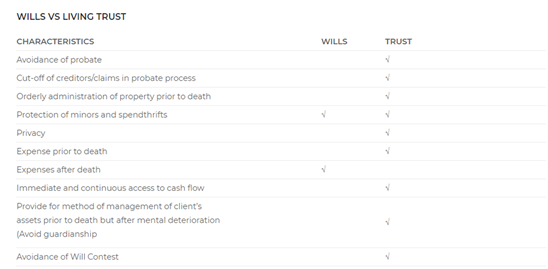Thursday, October 31, 2019 / 02:50PM/Samson Adetola for STL Trustees / Header Image Credit: Wealth Engineering
Estate Planning is the preparation of a plan to carryout an individual's wishes as to the administration and disposition of his/herproperty before or after his/her death. Planning also covers management ofpersonal affairs in the event of incapacity.
Simply put, Estate planning entails making a plan inadvance and naming whom you want to receive the things you own either before orafter you die. It is a process that involves people - your family, otherindividuals and, in many cases, charitable organisations of your choice. Italso involves your assets (your property) and the various forms of ownershipand title that those assets may take. It also addresses your future needs whenyou are unable to do it yourself.
Who needs an Estate Plan?
- Estate Planning is for EVERYONE.
- It is not just for "retired" people,although people tend to think about it more as they get older;
- It is not just for "the wealthy," either,although people who have built some wealth often think more about how topreserve it. It however means more to families with modest assets, because theycan afford to lose the least.
Issues to Consider in Creating AnEstate Plan
- What are my assets and what is theirapproximate value?
- Who should make decisions on my behalfconcerning my care and welfare if I become unable to care for myself?
- Whom do I want to receive those assets - and when?
- Who should be responsible for taking careof my children (particularly if they are minors) if I become unable to care forthem myself?
- What do I want done with my remains afterI die and where would I want them buried, scattered or otherwise laid to rest?
- Who should manage those assets if Icannot - either during my lifetime or after my death?
Estate Planning Instruments
- WILLS
- TRUST
Wills as an Instrument of EstatePlanning
- A Will is an instrument that directs howyour assets are to be distributed and your debts, taxes and expenses are paidafter your death.
- Also referred to as a Testament, it is alegal declaration by which a person, (the Testator), names one or more persons(the Executor(s)) to manage his or her Estate and provides for the distributionof his or her property at death. Wills remain the traditional way of giftingproperty to loved ones.
- When an individual die without a Will, itwould be necessary to compile a list of the dead person's assets in addition toidentifying beneficiaries to the assets. Unfortunately, until this process iscomplete, assets cannot be distributed, even to the already identifiedbeneficiaries.
Essential Characteristics of a Will
- Legal Declaration:The documents purporting to be a Will must be in legal form, i.e. in conformitywith the law, and must be executed by a person legally competent to make it.
- Disposition of Property:The declaration should relate to the disposition of property of the personmaking the Will.
- Death of the Testator: Thedeclaration as regards the disposal of the property must be intended to takeeffect after the Testator's death.
- Revocability: Theessence of every Will is that it is revocable during the lifetime of theTestator.
- Execution: Anunsigned Will is a worthless paper and its contents are not enforceable.Consequently, it is important for a Will to be duly signed by the Testator inthe presence of at least two (2) witnesses; and by the witnesses in thepresence of the Testator.
- Probate:Details below
The Probate Process of a Will
- Probate usually refers to the legalprocess whereby the deceased's assets are collected together and, followingvarious legal and fiscal steps and processes, eventually distributed to thebeneficiaries of the estate.
- Roughly speaking, the probate process beginswith an application by interested parties, to the Probate Registrar for theWill to be read upon the demise of the Testator.
- The will is usually read at a designatedtime or day as may be determined by the Probate Registrar.
- Afterwards Probate is usually grantedupon another application made to the Probate Registrar by the named Executorsof the Will.
- This grant is the authority that theExecutors of the Estate have to deal with the assets of the Estate inaccordance with the Will. Until this point, the Executors can hardly deal withthe assets of the Estate legitimately.
Trust as An Instrument Of EstatePlanning
Trust is alegal instrument or device whereby a person called a Settlor delivers part orall of his properties to another person called Trustee who administer andmanages the property/ies for the benefit of designated person/s calledBeneficiaries. The term "person" may refer to an individual or natural personor a juridical person like a corporation.
It is atransaction usually composed of three parties (Settlor, Trustee andBeneficiaries), each with his own obligations and rights, and involvingproperties and property interests to address various kinds of purposes.
The mostnotable feature of Trust is grounded in the fact that the legal title to theproperty is in one person while the beneficial interest which is referred to asthe "equitable title" is in another person.
The legalright ownership and control are in the trustee, subject to the duty of applyingand using the property as directed by the Settlor, while the right to enjoy thebenefits from the property is in the beneficiary of the trust.
Types Of Trust
1. LivingTrust
Living Trustis a Trust created during a Settlor's lifetime and which is expected to takeeffect during the lifetime of the Settlor.
Unlike a Will,which comes into play only after a person dies, one can start benefiting fromthe Living Trust while one is still alive. Hence, a Living Trust covers threeaspects of a Settlor's life: when the Settlor is alive & well, when theSettlor becomes incapacitated and when the Settlor dies.
It basicallyensures that the Settlor's assets are managed and distributed according to hiswishes and directives, without court supervision and involvement. This savesthe beneficiaries time and money and ensures that the Settlor's assets andtheir values are not matters for public record.
The basic goalof a Living Trust is to avoid probate. In a Living Trust, assets must bere-registered, retitled or otherwise validly transferred to the Trustee. Thisis particularly necessary to prevent the probate process on the Settlor'sdemise.
2. TestamentaryTrust
A TestamentaryTrust is created as part of a Will and becomes active after the Settlor'sdeath. With a Testamentary Trust, properties must go through probate beforethey become subject to the Trust.
A TestamentaryTrust is often created for a minor or young adult child where assets becomedistributable upon the death of the parents.
Often, peoplewho create Testamentary Trusts do so to protect minor children or children withdisabilities who will inherit the proceeds of the Trust.
In practicalterms, Testamentary Trusts are essentially driven more by the needs of thebeneficiaries (particularly infant beneficiaries) than any other considerations.

Mistakes in Estate Planning
- Notplanning at all
- Procrastinating
- Believingthe myth that Estate Planning is only for the wealthy
- Forgettingabout little details
- Failingto fund or update a created trust
- Failingto provide information regarding assets and documents
The Role of STL Trustees
- Assetmanagement, including selling assets to pay expenses and taxes.
- Distributingincome and assets to your beneficiaries.
- Makingcomplex tax decisions.
- Payingany debts and expenses.
- Collectingassets payable to the estate or Trust, including, in some situations, lifeinsurance or retirement benefits.
Related News
1. STL Trustees Wins Trustees of the Year Award
2. Latest Thinking on Wills and Trusts - WhyEstate Planning is Essential
3. Estate Planning for Discerning Individuals
4. FBNQuest and Muslim Faithful Share Insights onthe importance of Islamic Estate Planning
5. LatestThinking on Wills and Trusts - Why Estate Planning is Essential
6. EstatePlanning for Discerning Individuals
 Lagos, NG • GMT +1
Lagos, NG • GMT +1











 6058 views
6058 views








 Sponsored Ad
Sponsored Ad
 Advertise with Us
Advertise with Us







